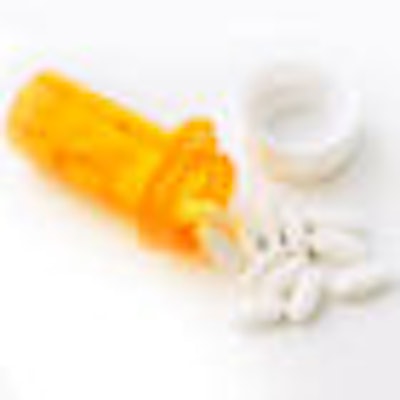
NEW YORK (Reuters Health) - Moxifloxacin was significantly more effective than clindamycin at controlling the pain of odontogenic/gingival inflammatory infiltrates, in a small phase II study by German researchers.
The study's lead author said that based on the results, he would recommend off-label use of moxifloxacin in this setting.
Dr. Georg Cachovan of the University of Hamburg told Reuters Health by e-mail that along with less pain, patients had significantly better and faster overall clinical responses with moxifloxacin than with clindamycin (e.g., improvements in inflammation, fever, lymphadenopathy, and ability to open the mouth).
In patients who had surgery for odontogenic abscesses, however, the two antibiotics were similarly effective.
Dr. Cachovan and colleagues report their multicenter trial in Antimicrobial Agents and Chemotherapy online December 20.
They say moxifloxacin also produced a markedly lower rate of adverse effects than did clindamycin, including nausea and diarrhea (the two most common).
The authors believe they're the first to evaluate moxifloxacin for treating gingival inflammatory infiltrates and to conduct a randomized, double-blind clinical study of moxifloxacin for odontogenic abscesses.
They had 71 evaluable subjects: 40 with gingival inflammatory infiltrates and 31 with dentoalveolar or periodontal abscesses. Patients in each group were randomized separately to receive either oral moxifloxacin 400 mg daily plus placebo four times daily, or clindamycin 300 mg four times daily plus placebo once daily, for five days.
Clindamycin was the comparator medication because in Germany it's the most commonly prescribed drug for odontogenic infections, according to the report. Patients could also receive other interventions, including lavage, surgical incisions, drainage, tooth extraction, debridement, and puncture, as well as analgesia with acetaminophen.
Among patients with infiltrates, the mean pain reduction two or three days after baseline, as measured by a visual analog scale, was significantly larger in patients who had received moxifloxacin. Patients with abscesses also experienced greater pain relief with moxifloxacin, but the difference was not statistically significant.
Treatment with moxifloxacin led to faster clinical improvement than did clindamycin in both groups, although again this was more pronounced in the patients with infiltrates.
The authors suggest that for outpatients in particular, the once-daily dosing of moxifloxacin might enhance compliance.
By Scott Baltic
Source: https://bit.ly/dEIWBU
Antimicrob Agents Chemother 2010.
Last Updated: 2011-01-07 15:36:29 -0400 (Reuters Health)
Copyright © 2011 Reuters Limited. All rights reserved. Republication or redistribution of Reuters content, including by framing or similar means, is expressly prohibited without the prior written consent of Reuters. Reuters shall not be liable for any errors or delays in the content, or for any actions taken in reliance thereon. Reuters and the Reuters sphere logo are registered trademarks and trademarks of the Reuters group of companies around the world.


%20nov12024.q9h8imREpF.png?crop=focalpoint&fit=crop&fp-x=0.5&fp-y=0.5&h=100&w=100&auto=format%2Ccompress&q=70)




%20nov12024.q9h8imREpF.png?crop=focalpoint&fit=crop&fp-x=0.5&fp-y=0.5&h=167&w=250&auto=format%2Ccompress&q=70)











